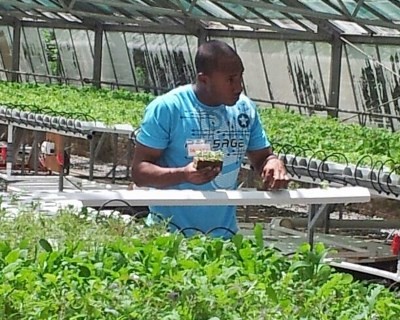
In a country the size of Barbados, where the scarcity of land remains a topical issue, it is no surprise that the agricultural technique of hydroponics has been growing in popularity.
Simply put, hydroponics is the art of growing plants without soil by using various techniques.
Last year, a group of 25 Agricultural Science students from the Barbados Community College (BCC) travelled to Essex County College, New Jersey, as part of a two-week exchange programme which focused on the field of hydroponics.
Funded by the European Union as part of the Ministry of Labour’s Human Resource Development Strategy, the trip gave students the opportunity to gain practical experience working in a hydroponic greenhouse, and to acquire the knowledge to develop these systems in Barbados.
One of the students was 21-year-old, Dario Cumberbatch. He admitted that it was his first trip to New Jersey and recalled that when he disembarked the plane, it was a culture shock. “I’m accustomed to this tropical weather but it was really cold. The food was also different from what I am used to eating here in Barbados.
“Essex is a very good college, the organisers were very friendly and they made us feel at home. We took part in the day-to-day activities in the greenhouse, and if we were not in the greenhouses we were at lectures. I learnt a lot and I would do it all over again,” he recounted.
Mr. Cumberbatch also explained that the students participated in practical work, including preparing the growing medium; transporting seeds between greenhouses; replanting; and cleaning. He noted that some of the fruits and vegetables grown in the greenhouses were donated to the less fortunate members of the community.
According to the Agricultural Science student, while the use of hydroponics promotes healthy living, not everything can be grown by this means. “It can be used to grow mostly leafy crops, kale, lettuce, tomatoes and flowers, not potatoes or root crops because there is no soil.
“They said that Americans don’t eat healthy because it is easier to buy a $1 burger than a $12 salad, and I see that in Barbados as well. It is cheaper to eat unhealthy foods. So, we can use hydroponics to grow more of our own food and eat healthier,” he pointed out.
Mr. Cumberbatch advised persons not be intimidated when they heard the term hydroponics. “There are many different forms of hydroponics, from large scale to something that would fit on a small table, from large, computerised systems to small systems made with PVC pipes.
“In New Jersey, they focused on urban farming because there isn’t that much arable land. People have kitchen gardens and rooftop gardens with hydroponic systems,” he explained.
Another student, 27-year-old Terryann Harding, mentioned that the lecturers at Essex County College were pleasantly surprised at how knowledgeable the Barbadian students were about agriculture.
“When we first got there, one of my lecturers asked about the importance of compost in soil, and when I gave the answer and he was blown away because he didn’t expect us to know. We are behind in terms of the way they are doing hydroponics and as it related to the greenhouse setup, but the level of education we receive at BCC is still very advanced,” she maintained.
Adding that she found the classrooms in the New Jersey-based college “very colourful and inviting”, Ms. Harding believed that her experience was very beneficial and that other agricultural students should have an opportunity to participate.
“I think that students will become more aware and not base everything on what they see here in Barbados. Having different experiences; seeing how other cultures do things and how they react to certain things can help an individual to be more open-minded,” she reasoned.
The young farmer currently owns pigs, ducks and sheep, and is now seeking to partner with Mr. Cumberbatch and some of her classmates to create their own hydroponics system here in Barbados.
When the Barbados Community College installs its own hydroponics system in the near future, it is expected that students will have the opportunity for hands-on experience in this special type of farming.





